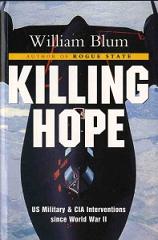
Killing Hope
William Blum
469 pages including index
published in 2003
William Blum is a veteran leftwing journalist, active since the 1960ties, who made his name leaking the name and addresses of 200 CIA employees back in 1969. Since then he has been working in relative obscurity until around the turn of the millennium when he wrote a bestselling book about the US’s foreign police: Rogue State: A Guide to the World’s Only Superpower. It came at the right time to find its audience, just as interest in the subject soared due to the September 11 attacks. This succes is probably what got Killing Hope published, as it’s an updated version of one of Blum’s older books, originally published in 1986 as The CIA: A Forgotten History. It certainly has some of the hallmarks of a cash-in book, with the updating only going as far as the mid-nineties and the bulk of the book not noticably updated from the first edition. Many of the earlier chapters do not show much awareness of events and new revelations after 1986, if you see what I mean.
Killing Hope is the history of US military and covert interventions since World War II, with each chapter detailing a specific case. The chapters are in order of chronology, with several countries with a long history of US intervention having multiple chapters devoted to them. As Blum shows again and again in these chapters, the US talks a great deal about democracy and freedom, but the reality of its foreign policy at least since World War II is far different. With the excuse of “fighting communism” (or these days, “terrorism”) again and again the US has interfered on the side of dictatorships, nobbled democracies or fought liberation movements in order to safeguard its interests, be they strategic geopolitical ones or commercial ones. And Killing Hope is far from exhaustive, even in its original timeframe of 1945-1985 with Vietnam e.g. only having one short chapter devoted to it and little attention paid to other Asian countries like Taiwan, Japan or South Korea or even the UK.

